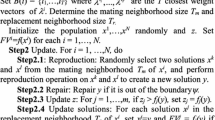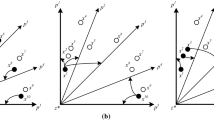Abstract
In multi-objective evolutionary algorithm based on decomposition, replacement strategy (RS) plays a key role in balancing population convergence and diversity. However, the existing RSs either focus on the neighborhood or global replacement strategy, which may have difficulties in solving the complex multi-objective optimization problems. To solve this problem, a hybrid neighborhood and global replacement strategies for multi-objective evolutionary algorithm based on decomposition (MOEA/D) is proposed. In this mechanism, a probability threshold pt is used to determine whether to implement neighborhood or global replacement strategy to balance convergence and diversity. Meanwhile, an offspring generation method is designed to generate high-quality offspring solutions for each sub-problem, which can improve the success of the replacement strategy. Based on MOEA/D, a new MOEA/D-HRS algorithm is designed, and it is compared with some state-of-the-art multi-objective evolutionary algorithms (MOEAs) in a series of bi-objective and three-objective test instances with linear or nonlinear various linkages. The experimental results show that MOEA/D-HRS can achieve the best performance in most test instances.




Similar content being viewed by others
Explore related subjects
Discover the latest articles, news and stories from top researchers in related subjects.References
Zhou A, Zhao H, Zhang H. (2019) Pareto optimal set approximation by models: a linear case. Paper presented at international conference on evolutionary multi-criterion optimization, pp. 451–462
Srinivas N, Deb K (1994) Muiltiobjective optimization using nondominated sorting in genetic algorithms. Evolutionary Comput 2(3):221–248
Deb K, Agrawal S, Pratap A, Meyarivan T (2000) A fast elitist non-dominated sorting genetic algorithm for multiobjective optimization: NSGA-II. Paper presented at conference on parallel problem solving from nature. Springer, pp. 849–858
M. Laumanns. (2001) SPEA2: Improving the strength Pareto evolutionary algorithm. Institut of Technische Informatik und Kommunikationsnetze (TIK).
Zitzler E, Simon Künzli (2004) Indicator-based selection in multiobjective search. International Conference on Parallel Problem Solving from Nature, Birmingham, UK, Springer, pp. 832–842
Tharwat A, Houssein EH, Ahmed MM, Hassanien AE, Gabel T (2018) MOGOA algorithm for constrained and unconstrained multi-objective optimization problems. Appl Intell 48(8):2268–2283
Zhang Q, Li H (2007) MOEA/D: A multiobjective evolutionary algorithm based on decomposition. IEEE Trans Evol Comput 11(6):712–731
Mashwani WK, Salhi A (2012) A decomposition-based hybrid multiobjective evolutionary algorithm with dynamic resource allocation. Appl Soft Comput 12(9):2765–2780
Zhang H, Zhou A, Zhang G, Singh HK (2017) Accelerating MOEA/D by nelder-mead method. IEEE Congress on Evolutionary Computation, San Sebastian, Spain, IEEE, pp. 976–983
Zhou A, Zhang Y, Zhang G, Gong W (2015) On neighborhood exploration and subproblem exploitation in decomposition based multiobjective evolutionary algorithms. IEEE Congress on Evolutionary Computation. Sendai, Japan, IEEE, pp 1704–1711
Zhang J, Zhou A, Zhang G (2015) A multiobjective evolutionary algorithm based on decomposition and preselection. Bio-inspired computing-theories and applications. Springer, Berlin
Lin Q, Tang C, Ma Y, Du Z, Li J, Chen J, Ming Z (2016) A novel adaptive control strategy for decomposition based multiobjective algorithm. Comput Oper Res 78:94–107
Lin Q, Liu Z, Yan Q, Du Z, Coello CAC, Liang Z, Wang W, Chen J (2016) Adaptive composite operator selection and parameter control for multiobjective evolutionary algorithm. Inf Sci 339:332–352
Li K, Zhang Q, Kwong S, Li M, Wang R (2014) Stable matching-based selection in evolutionary multiobjective optimization. IEEE Trans Evol Comput 18(6):909–923
Wang Z, Zhang Q, Zhou A, Gong M, Jiao L (2017) Adaptive replacement strategies for MOEA/D. IEEE Transact Cybernetics 46(2):474–486
Li J, Tan Y (2019) A comprehensive review of the fireworks algorithm. ACM Comput Surv 52(6):1–28
L. Liu, S. Zheng, and Y. Tan. (2015) S-metric based multi-objective fireworks algorithm. IEEE Congress on Evolutionary Computation, pp. 1257–1264.
Naujoks B, Beume N, Emmerich M (2005) Multi-objective optimization using s-metric selection: application to three-dimensional solution spaces. IEEE Congr Evolut Comput 2:1282–1289
Li H, Ong YS, Gong M, Wang Z (2019) Evolutionary multitasking sparse reconstruction: framework and case study. IEEE Trans Evol Comput 23(5):733–747
Gong M, Wang Z, Zhu Z, Jiao L (2017) A similarity-based multiobjective evolutionary algorithm for deployment optimization of near space communication system. IEEE Trans Evol Comput 21(6):878–897
Liu J, Gong M, Miao Q, Wang X, Li H (2018) Structure learning for deep neural networks based on multiobjective optimization. IEEE Transact Neural Networks Learn Syst 29(6):2450–2463
Gong M, Liu J, Li H, Cai Q, Su L (2015) A multiobjective sparse feature learning model for deep neural networks. IEEE Transact Neural Networks Learn Syst 26(12):3263–3277
Li J, Sang H, Han Y (2018) Efficient multi-objective optimization algorithm for hybrid flow shop scheduling problems with setup energy consumptions. J Clean Prod 181:584–598
Malik R, Dhir R, Mittal SK (2019) Remote sensing and landsat image enhancement using multiobjective PSO based local detail enhancement. J Ambient Intell Human Comput 10(9):3563–3571
David L, González–ÁlvarezMiguel A. Vega–RodríguezJuan A. Gómez–PulidoJuan M. Sánchez-Pérez. (2010) Using a parallel team of multiobjective evolutionary algorithms to solve the motif discovery problem. Distrib Comput Artif Intell 79:569–576
Gong M, Li H, Meng D, Miao Q (2019) Decomposition-based evolutionary multi-objective optimization to self-paced learning. IEEE Trans Evol Comput 23(2):288–302
Gong M, Li H, Luo E, Liu J, Liu J (2017) A multi-objective cooperative coevolutionary algorithm for hyperspectral sparse unmixing. IEEE Trans Evol Comput 21(2):234–248
Miettinen K (1999) Nonlinearmultiobjectiveoptimization. Kluwer Academic Publishers, Amsterdam, pp 66–74
Jin Y (2005) A comprehensive survey of fitness approximation in evolutionary computation. Soft Comput 9(1):3–12
Naujoks B, Beume N, Emmerich M (2005) Multi-objective optimisation using s-metric selection: application to three-dimensional solution spaces. IEEE Cong Evolut Comput 2:1282–1289
Li H, Zhang Q (2009) Multiobjective optimization problems with complicated pareto sets, MOEA/D and NSGA-II. IEEE Trans Evol Comput 13(2):284–302
H. H. Tam, M. F. Leung, Z. Wang, S. C. Ng, C. C. Cheung, and A. K. Lui. (2016) Improved adaptive global replacement scheme for MOEA/D-AGR. IEEE Congress on Evolutionary Computation. Vancouver, BC, Canada, IEEE, pp 2153–2160
Y. Li, A. Zhou, and G. Zhang. (2014) An MOEA/D with multiple differential evolution mutation operators. IEEE Congress on Evolutionary Computation, Beijing, China, IEEE, pp. 397–404
Li K, Kwong S, Zhang Q, Deb K (2015) Interrelationship-based selection for decomposition multiobjective optimization. IEEE Transactions on Cybernetics 45(10):2076–2088
Acknowledgment
This research is supported in part by the Anhui development and Reform Commission new energy vehicle and intelligent network vehicle industry technology innovation project, Project Name: Development and test of key parts of hydrogen fuel cell vehicle.
Author information
Authors and Affiliations
Corresponding author
Additional information
Publisher's Note
Springer Nature remains neutral with regard to jurisdictional claims in published maps and institutional affiliations.
Supplementary Information
Below is the link to the electronic supplementary material.
Rights and permissions
About this article
Cite this article
Chen, X., Wang, H., Chu, J. et al. Hybrid neighborhood and global replacement strategies for multi objective evolutionary algorithm based on decomposition. Evol. Intel. 15, 1715–1728 (2022). https://doi.org/10.1007/s12065-021-00582-1
Received:
Revised:
Accepted:
Published:
Issue Date:
DOI: https://doi.org/10.1007/s12065-021-00582-1




